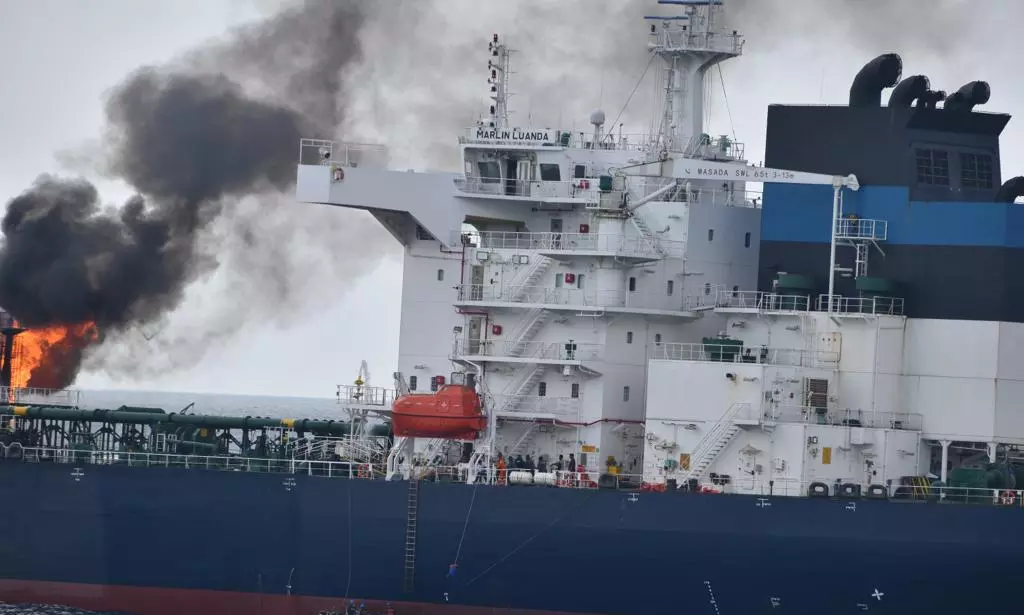UNCTAD raises alarm on global trade disruptions
Escalating attacks on ships in Red Sea are adding strain to shipping routes already hit by conflict and climate change

MV Marlin Luanda hit in the Red Sea by a missile fired by Houthis. Photo Credit: Indian Navy/X
UNCTAD, the UN’s trade and development body, has raised serious concerns over escalating disruptions to global trade.
"Recent attacks on ships in the Red Sea, combined with geopolitical tensions affecting shipping in the Black Sea and the impacts of climate change on the Panama Canal, have given rise to a complex crisis affecting key trade routes," says the trade body.
The Suez Canal, a critical waterway connecting the Mediterranean Sea to the Red Sea, handled approximately 12-15 percent of global trade in 2023, the update added. "UNCTAD estimates that the trade volume going through the Suez Canal decreased by 42 percent over the last two months."
In one of the latest attacks, Indian Navy's guided missile destroyer INS Visakhapatnam, deployed in the Gulf of Aden responded to a distress call from MV Marlin Luanda on the night of January 26, 2024.
"The fire fighting efforts onboard the distressed merchant vessel are being augmented by the NBCD team along with firefighting equipment, deployed by INS Visakhapatnam to assist the crew onboard the MV. The vessel has 22 Indian & one Bangladeshi crew onboard," Indian Navy posted on X.
When Houthies claim, for example, having attacked a British tanker, we could equally well say they have attacked an Indian ship as it was crewed almost exclusively by Indians, writes Lars Jensen in his LinkedIn post.
"The Indian Navy has indeed been active during this crisis and also came to the aid of the tanker yesterday. But what are the other countries doing to stand up for their seafarers?"
The ongoing conflict in Ukraine has also triggered substantial shifts in oil and grain trades, reshaping established trade patterns.
"The Panama Canal, another key artery for global trade, is grappling with a severe drought that has diminished water levels, resulting in a staggering 36 percent reduction in total transits over the past month compared to a year ago.
"The long-term implications of climate change on the canal's capacity are raising concerns about enduring impacts on global supply chains. The crisis in the Red Sea, marked by Houthi-led attacks disrupting shipping routes, has added another layer of complexity."
Freight rates and emissions surge
In response to the Red Sea crisis, major players in the shipping industry have temporarily suspended Suez transits, UNCTAD says in its update.
"Notably, weekly container ship transits have plummeted by 67 percent. Tanker transits and gas carriers are also experiencing significant declines.
"Meanwhile, shipping prices are increasing. The $500 surge in the average container spot freight rates during the last week of December was the highest ever weekly increase."
Insurance premiums have also surged, compounding the overall cost of transit.
Additionally, ships rerouted from the Suez and Panama Canal routes are compelled to travel faster to compensate for detours, burning more fuel per mile and emitting more CO2, further exacerbating environmental concerns.
“Here we see the global impact of the crisis as ships are seeking alternative routes,” says Jan Hoffmann, Head of Trade Logistics, UNCTAD.
Implications
Prolonged interruptions, particularly in container shipping, pose a direct threat to global supply chains, raising the risk of delayed deliveries and higher costs.
"While current container rates are approximately half of the peak seen during the Covid-19 crisis, it will take time for the higher prices to hit consumers with the full impact expected within a year, " the update added.
Energy prices are witnessing a surge as gas transits are discontinued, directly impacting energy supplies, especially in Europe. "The crisis is also impacting global food prices, with longer distances and higher freight rates potentially cascading into increased costs. Disruptions in grain shipments from Europe, the Russian Federation and Ukraine pose risks to global food security, affecting consumers and lowering the prices paid to producers."
Hoffmann says: “Developing countries are particularly vulnerable to these disruptions, and UNCTAD remains vigilant in monitoring the evolving situation."
The current challenges underscore trade's vulnerability to geopolitical tensions and climate-related challenges, demanding collective efforts for sustainable solutions, especially in support of the countries more vulnerable to these shocks, the update added.



